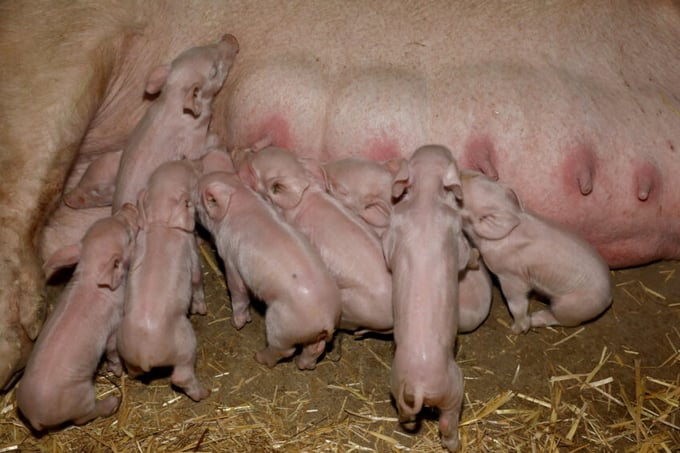November 26, 2025 | 04:06 GMT +7
November 26, 2025 | 04:06 GMT +7
Hotline: 0913.378.918
November 26, 2025 | 04:06 GMT +7
Hotline: 0913.378.918

Such a large litter is a very rare phenomenon that can only be explained by a set of factors. Photo: Henk Riswick
The number is much higher than the Brazilian average of 12 piglets on commercial pig farms. Embrapa Suínos e Aves researcher Osmar Dalla Costa reveals that he does not remember another case with the same numbers in 37 years dedicated professionally to pig farming.
A high-performance sow usually generates 36 piglets over a whole year, with an average of 2.4 farrowings each 12 months. The best commercial farms reach averages between 14 and 16 piglets. “It is a very rare phenomenon that can only be explained by a set of factors, such as hyperovulation and high-quality semen, in addition to good environmental conditions and nutrition”, Dalla Costa says.
The sow gave birth to 41 piglets in a procedure that lasted almost 5 hours, at Granja Dal Bó. The manager of the farm, Ernani Funini, says the super result is rare but also a consequence of improvements carried out in recent months. Even so, the highest number ever obtained in the unit in a single farrowing reached a maximum of 26 piglets. Granja owner Elton Dal Bó commented that, although it is a curious fact, this demonstrates the team’s performance.
A female sow normally has 7 pairs of teats and, thanks to genetic evolution, some breeders already have 8 pairs. Still, 14 or 16 teats are far too few to feed 41 piglets. The recommended procedure in these cases is to use nursing sows and, also, alternate feeding shifts between the piglets. “In any case, due to a large number of live births, the animals are quite small and most of them may not survive”, Dalla Costa explains.
Other cases of hyperprolificacy occurred in April 2020, when a sow gave birth to 36 piglets in the municipality of Saudades, and in July 2020 in the municipality of Herciliópolis, with 34 piglets in a single farrowing.
Litters with a large number of piglets are not usually profitable. Despite indicating good reproductive conditions, the development possibilities of very small piglets are fatally compromised, affecting zootechnical indices and productive performance.
(PP)

(VAN) Brazil's COP30 presidency pushed through a compromise climate deal on Saturday that would boost finance for poor nations coping with global warming but that omitted any mention of the fossil fuels driving it.

(VAN) Poultry farmers in the UK have been warned that they could face one of the worst winters yet for bird flu.

(VAN) Prices of main-crop paddy have risen sharply, with jasmine rice hitting 16,100 baht per tonne — the highest level in years.

(VAN) In Brazil, FAO unveiled a series of reports and initiatives showing how sustainable agrifood systems are a solution to the climate crisis.

(VAN) With names like neodymium and dysprosium, rare-earth elements sound exotic — and their perceived scarcity has only added to the mystique.

(VAN) In a new study published in Trends in Biotechnology, researchers used a gene-editing technology called CRISPR to increase a fungus's production efficiency and cut its production-related environmental impact by as much as 61%- all without adding any foreign DNA.

(VAN) A top official in Beijing’s Cop delegation says China is committed to clean energy – but US’s absence is a problem.